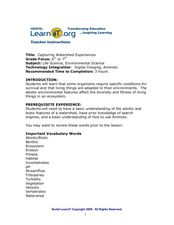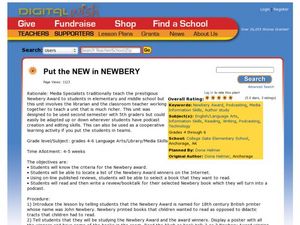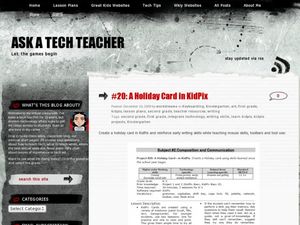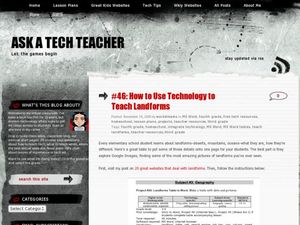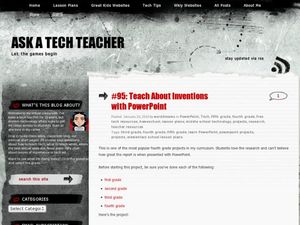Curated OER
Picture This
Students create a descriptive paragraph conveying ideas utilizing a personal photograph as a prompt for their writing. This concept includes the writers emotions, personal issues, education, art and photography. They share insights to...
Curated OER
Fossil Formation Fun
Students compare the three types of fossils: preserved organisms, mineral replacement fossils, and impression fossils. They create a model of amber,
sponge fossil, and make traces of fossil.
Curated OER
Adjective Games and Associated Worksheets
In this adjective games worksheet, students use adjective wheels, practice spelling adjectives, combine roots words to create an adjective, and explain how different objects using adjectives. Teachers are given detailed information on...
Curated OER
Species Charades
Students identify endangered species. In this endangered species lesson, the teacher leads a discussion about endangered species, then the class plays a game of charades to pantomime animal behavior.
Curated OER
Solar Matters II
Students research solar energy. In this solar energy lesson, students construct a KWL chart and research solar energy through various websites and related readings. Students complete a science journal page as an assessment.
Curated OER
The Truth About Human Rights
Students explore the concept of human rights. In this human rights lesson, students watch 2 videos regarding human rights violations around the world since 2001. Students explore several websites that feature human rights violations....
Curated OER
Meet the People In Your Neighborhood
First graders recognize various occupations and their roles in the community. In this communities lesson, 1st graders read the story I Stink and view a Powerpoint presentation of "Community Helpers." Students create a costume to...
Curated OER
Internet Activity-Visit the Tidepools!
Students examine a virtual tidepool. In this tidepools instructional activity, students examine samples of tidepool organisms and discuss their characteristics. Students use the Internet to visit suggested websites on tidepools.
Curated OER
Scooting Along!
Students investigate how Newton's Third Law affects vehicle design. In this Newton's Third Law lesson, students use a web site to research Newton, his third law, and how to design a vehicle that uses a balloon for power. They sketch and...
Curated OER
Arthropods at Home- Spider, Isopod, or Any Arthropod
Learners design a habitat for an arthropod. In this organisms lesson, students read the book, A House is a House For Me. Learners find an arthropod and create a terrarium.
Curated OER
Capturing Watershed Experiences
Students observe organisms found in the water. In this instructional activity on organisms, students collect water from local streams and tributaries in order to study the organisms found in the water. As a culminating activity, students...
Curated OER
Put the NEW in NEWBERY
Students read Newbery award books. In this Newbery book lesson, students look online to find all the books that have received this award and look through online reviews to find one they would like to read. After finishing the book, they...
Curated OER
A Holiday Card in KidPix
Students create a holiday card using computer software. In this computer card making lesson, students design an original holiday card using a variety of tools. Students navigate the software utilizing various tools.
Curated OER
How to Use Technology to Teach Landforms
Students create a landform table on the computer. In this geography lesson, students use Microsoft Word to design a 3 column table. They list different landforms, examples, and attach a picture of each.
Curated OER
Teach Inventions with PowerPoint
Students research famous inventors and what they invented. In this technology instructional activity, students gather facts about a specific invention and create a PowerPoint slideshow about it. Students practice adding in animation and...
Curated OER
How Probable is It?
Students explore probability. In this probability lesson, students look at videos and websites where they discover probability facts that can be used in situations. They determine the probability of different events.
Curated OER
Geometry and Spatial Sense
Students investigate geometric shapes in 2 and 3 dimensions. In this geometry lesson, students create a model chocolate factory working in groups and using an actual cake. Students take a quiz about measurement equations dealing with...
Curated OER
Where Do We Live?
Second graders investigate various types of habitats. In this habitat exploration lesson, 2nd graders view a PowerPoint presentation on habitats and explore websites to gather more information. Students choose a habitat to focus on and...
Curated OER
Deserts: How Do You Define One?
Second graders identify what constitutes as a desert by reading a habitat checklist. In this environment lesson plan, 2nd graders read a nature website to discover facts about the desert and where they are located. Students utilize art...
Curated OER
Design a Plankton
Students explore animal and plant adaptation. In this ecosystems science lesson, students view websites to gain information about plankton and its interdependence within ecosystems. Students identify ways in which plankton has adapted...
Curated OER
Filling The Urn
Learners calculate the area under a curve. In this calculus instructional activity,students calculate the area by integrating the equation. They calculate the volume of cylindrical shapes created between graphs.
Curated OER
Using Tables to Solve Linear Functions
Oh that intercept! Budding algebra masters solve linear equations from standard to intercept form. They identify the slope and y-intercept to help graph the lines, an then create coordinate pairs using a table of values. Great TI tips...
Curated OER
Transformations of Functions 1
Learn how to solve problems with transformation. Students perform transformation on their graphs. Then, they use the TI to create a visual of the graph as it is moving along the graph.
Curated OER
Transformations of Functions 2
Solving problems on the TI graphing calculator can be quite easy. Students observe the properties of transformation of functions and create a formula for the transformation.












